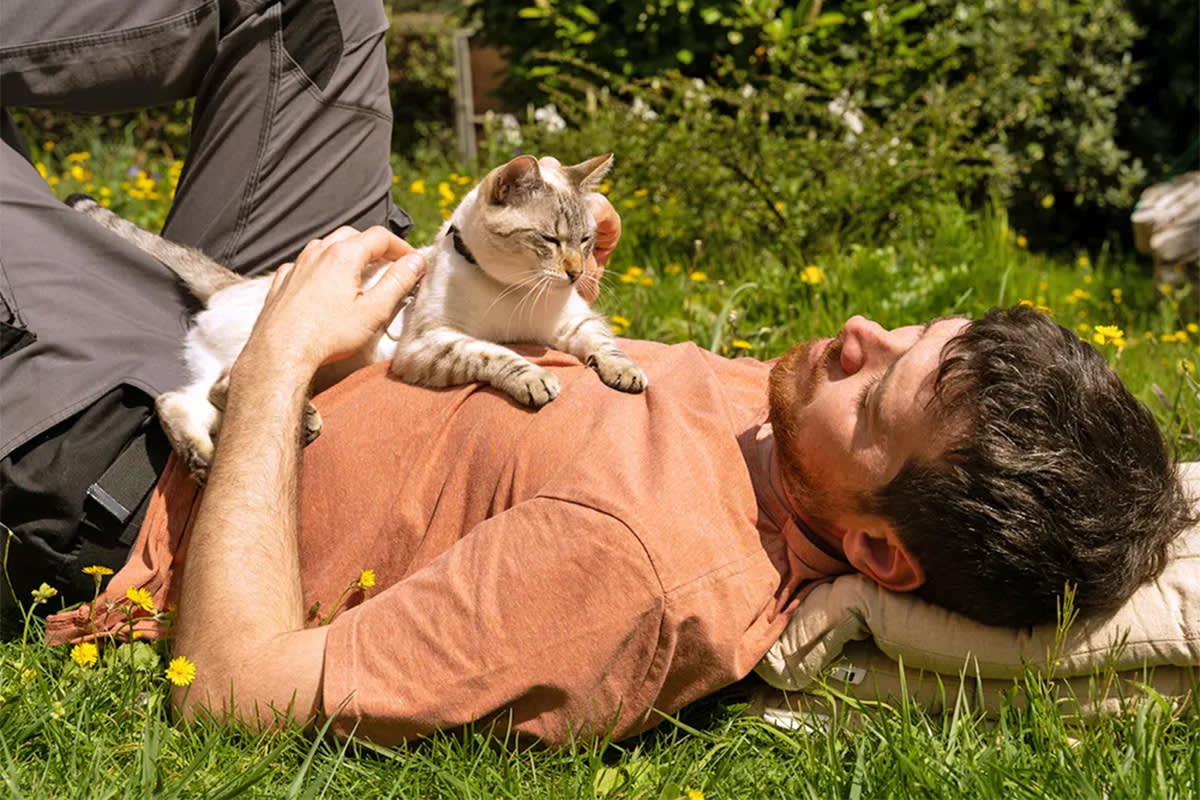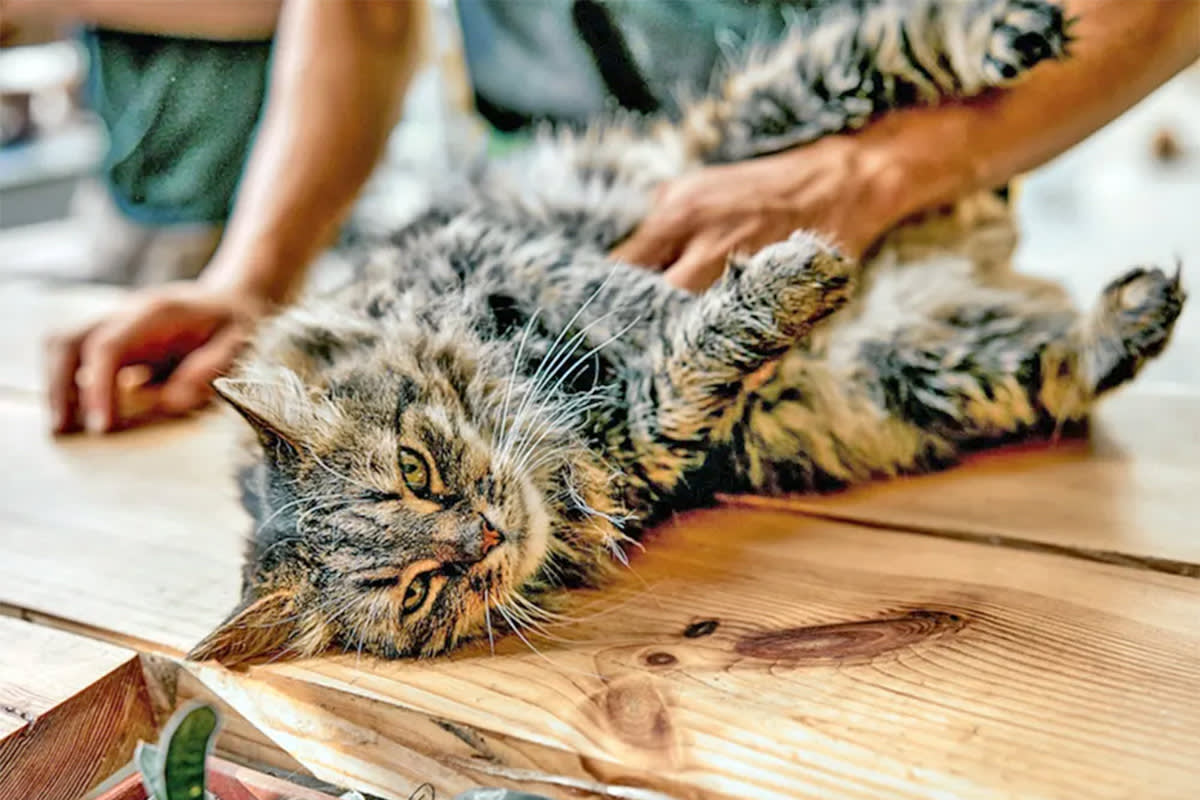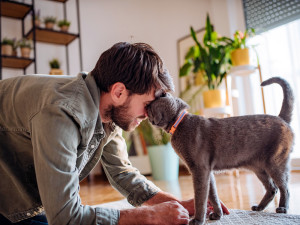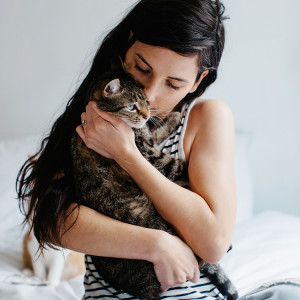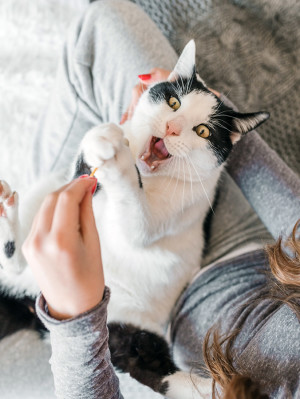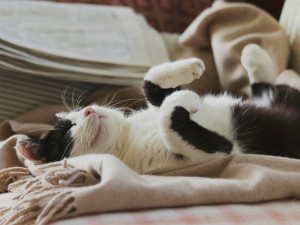Does Your Cat Think You’re Their Baby? They Sure Do Lick You a Lot
This internet is saying cats think they are the parents, not the other way around.
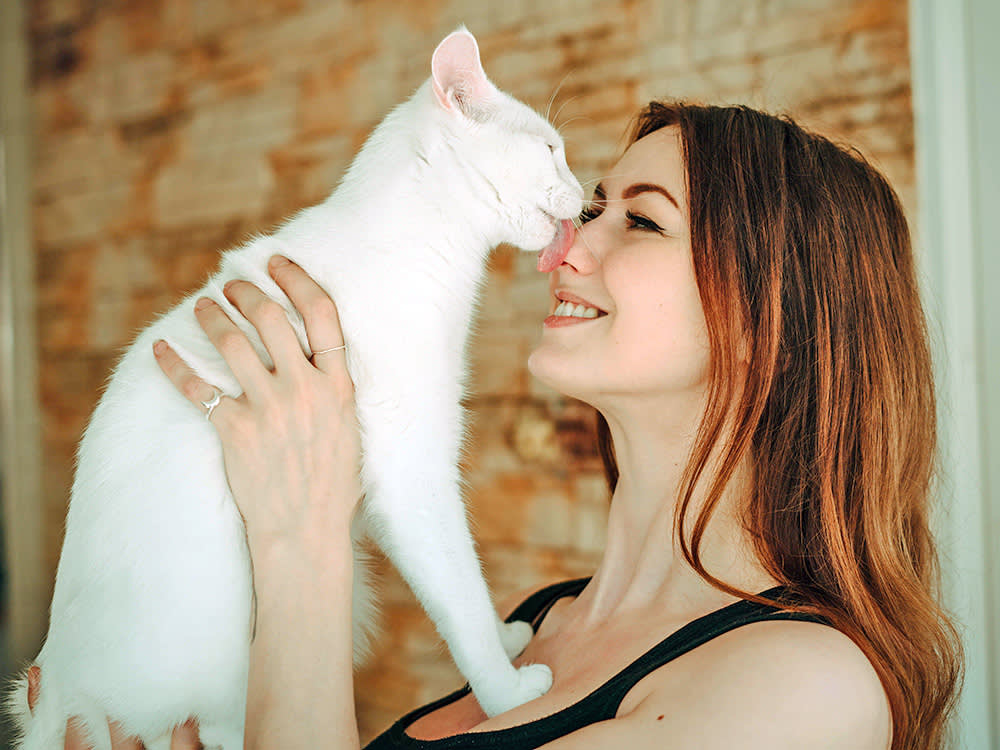
Share Article
Some of us think of our cats as our babies. And why wouldn’t we? We carry them around (if they let us), take them to the vet for checkups, and feed them when they cry. When my daughters and I adopted our cat Winston as a kitten, he used to crawl into our laps and nurse his paw while we rocked him. So when I saw an Instagram postopens in new tab that suggested cats might see us as their children, rather than the other way around, I was intrigued.
"Unlike dogs, who often treat humans as pack leaders, cats show behaviors toward their owners that mirror how they interact with their young,” the post says. “They may bring you ‘gifts,’ groom you, follow you around, or meow — a sound adult cats rarely use with each other — to communicate like they would with their own kittens.” Is it possible that my cats, including the one who used to nurse in my arms, feel parental toward me? Or that, in the words of that Instagram post, they think I’m “just a big, clumsy, furless baby” they’re stuck taking care of? I turned to the experts.
“As humans, we try to understand the world from a human viewpoint,” Joey Lusvardi, a certified cat behavior expert at Class Act Catsopens in new tab, tells me. Because we can’t truly know whether our cats think of us as “a kitten, a parent, or a treat vending machine,” he suggests we shift our point of view away from our usual human-centric frame. “I don’t think it’s quite [that] simple,” he says. “More likely, we have a unique relationship with cats that is different than how cats see other cats. To me, that’s much cooler than a cat thinking of you as their kitten or their parent.”
Why does your cat bring you gifts, groom you, follow you around, and meow at you?
There is some merit to a few of the points in the Instagram post, says Dr. Julie Hunt, a veterinary consultant for Embrace Pet Insuranceopens in new tab. “Yes, bringing ‘gifts’ of half-dead creatures is something that cats do for their kittens,” she tells me. They do this both to feed their young and also to train their kittens to hunt (that’s where the “half-dead” bit comes in).

It’s possible, though, that they’re just taking pity on us, their inept human parents. “Perhaps a cat observes that their human does not appear to be able to hunt effectively,” she says, and so the cat is trying to train you to hunt by bringing you prey — even if it’s a toy mouse. “This is a gesture of kindness and care,” Dr. Hunt says.
Lusvardi has another take on the meaning of cat gifts: “While the classic explanation has been that the cat is trying to teach you to hunt like a kitten, that may not be completely accurate. For cats, playing is hunting and hunting is playing. Bringing you a mouse might be their way of saying, ‘I brought you this fun toy. Let’s play!’”
As for grooming, Dr. Hunt says that while mother cats do clean up their kittens, adult cats also groom each other. “I interpret a cat grooming their human to mean that the human is seen as a close family member or friend,” she says. The same goes for following us around. “Yes, mother cats follow their kittens around, but I have also observed cats following another cat when they are bonded to that cat. So, when my cats follow me around, it may simply be because they’re socially bonded to me, and not because they think I’m their child.
When cats meow, it is probably not a sign that cats think we’re their kittens. “Generally, a meow is a request for something, whether that is food, attention, or to be let into or out of a roomopens in new tab,” Dr. Hunt says. “However, it can also express an emotion, greeting, or response to a human vocalization.” She explains that mother cats use other sounds besides meows to communicate with their kittens, “including chirps, chirrups, and trills, which they uncommonly use with humans.”
The bond goes both ways.
Veterinarian Dr. Preston Turanoopens in new tab says that while it’s likely that our cats do not see us as their babies, that doesn’t mean they aren’t bonded to us, and vice versa. “The bond is formed through feedings, positive interactions, playtime, and comfort. Once formed, cats often see you as part of their social group,” he tells me. That means they might bring me treats, or try to comfort me when I’m in distress.
Dr. Hunt reminds me that all cats, and all cat-human relationships, are unique. “It is very possible that one cat may interact with an owner in one dynamic (a friendship) while another may interact in a different dynamic (mutual distaste, a parental interaction/caretaking). Even for the same cat, that dynamic may change over time,” she explains.
If we’re inclined to try and fit our relationships with our cats into a parent-child model, it might be due to our hormones, Dr. Turano says. “Oxytocin is a hormone that is linked to milk production and nursing. But it may also be released during human-animal interaction, and results in calming and strengthening of the bond.” And if your cat never brings you food, follows you, or otherwise behaves in a maternal manner, that’s normal, too. “The bond can go both ways, but all cats are unique, and some may prefer you providing all the benefits of the bond!” Dr. Turano says.
Does the answer really matter?
“Cats are wonderful companions with complex social behaviors that can be interpreted in many ways,” says veterinarian Dr. Victoria Carmella, an advisor at Pet Honestyopens in new tab. She says there are multiple meanings behind our cats’ actions, such as instinct, affection, and the cat/cat-parent bond. “Rather than seeing their people strictly as kittens or as mothers, cats form distinct relationships with us that are very special and unique in comparison to cat-to-cat connections,” she says.
Cat behaviorist Stephen Quandtopens in new tab brings up another salient point: If it were true that cats see us as their children, then only female cats would do things like leave their toy mice on our pillows and follow us around meowing, “since males have no relationship with their young as a rule, at least if they are living outdoorsopens in new tab.”
When pressed, he falls into the cats-are-our-babies camp. “They ask for the things that kittens ask for and that mom provides: food, attention, comfort, security, and play. They do this by meowing, purring, and rubbing against us as they would with Mom.”
In the end, though, does it really matter? When I asked Quandt if the whole “who’s the baby” question is silly, he reassured me that it isn’t — it’s just not totally knowable. “The best we can do is to take what we observe about cats in nature and make reasonable and logical inferences without getting too caught up in exactly what’s happening,” he says. “It can sometimes be better to ask if this thing that they’re doing is a good thing, or not a good thing, rather than ask exactly what is this thing that they’re doing.”
When it comes to things like leaving their ratty old toy mice inside our shoes and meowing at us, Lusvardi notes that while we can’t know exactly what our cats’ motivation is without asking them, we can know that it indicates a positive relationship. And that, he says, is what matters most.
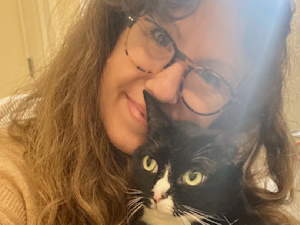
Elizabeth Laura Nelson
Elizabeth Laura Nelson is a writer and editor based in Brooklyn, New York, whose work has appeared in The New York Times, Jenny, Best Life, YourTango, Elite Daily, and more. She focuses her work on relationships, health and wellness, midlife, and lifestyle. As a child, Elizabeth was scared of cats (claws and teeth, yikes) but she has since gotten over her fear and now shares her home with three sweet and gentle feline companions who make life better (and cuddlier) every day.
Related articles
![Man cuddling his gray cat.]()
Does Your Cat Think You’re Their Mom?
You love them like a child, but is the feeling mutual?
![dark-haired woman hugging cat that has imprinted on her]()
10 Signs Your Cat Has Imprinted on You
Feeling like you have a little shadow these days? Here’s why that’s happening.
![a cat making an excited face at a person's hand]()
Your Cat Can Make Nearly 300 Unique Facial Expressions, Study Finds
They’re not so mysterious after all.
![Black and White cat with its eyes closed laying on its back on a scarf]()
Is My Cat Happy?
In this excerpt from her new book, Purr: The Science of Making Your Cat Happy, animal behaviorist Zazie Todd shares science-backed insights into our cats’ moods.
Why Does Your Cat Rub Against You?
All that cat hair on your pants is just a bonus.
Why Does My Cat Stretch When They See Me?
It’s cute, but what does it mean?
